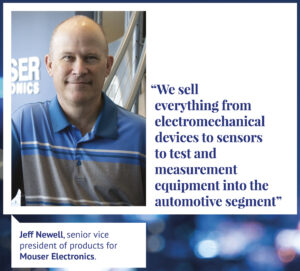
Some distributors say their sales to the automotive supply chain are rising because of semiconductor shortages, rising electronic content in cars and the trend towards electric vehicles.
Automotive represents a small percentage of electronics distributors’ overall sales, but distributors say there has been a sharp increase in demand by automakers and their key systems suppliers and contract manufacturers fueled by severe shortages of some semiconductors.
Some distributors say demand by automotive customers may be short lived while others say there is a paradigm shift occurring and automotive OEMs will continue to use the distribution channel even after shortages abate.
Catalog distributors have a long history of servicing the auto industry. When automakers and their tier 1 suppliers design new systems, their engineers frequently turn to catalog distributors for components in the development of new systems.
Automotive customers buy a wide range of parts from distributors, including semiconductors, passives and connectors, among other components. “We sell everything from electromechanical devices to sensors to test and measurement equipment into the automotive customer,” said Jeff Newell, senior vice president of products for Mouser Electronics. “It’s an important customer segment from a design perspective,” he said.
He said transportation, which includes automotive, represents about three per cent of Mouser’s sales. However, that figure does not include sales to electronics manufacturing services (EMS) providers that manufacture systems for automotive customers.
He said Mouser does business with all areas of the automotive supply chain. The distributor sells parts to automotive suppliers such as Continental, Delphi and Daimler-Benz, among others. “They are looking to us for new products in new product engineering quantities. We believe design engineers start their designs with us,” said Newell. Mouser also sells components to lower tier suppliers as well. “We are probably more important to those folks because they find it easier to find the products that they need and we get the parts to them quickly with no hassle,” said Newell.
 Shortages boost business
Shortages boost business
Mouser, like other distributors, has seen an increase in sales over the last six months because of semiconductor shortages. Many automakers slowed down production last year because of COVID-19. As a result, automotive customers stopped ordering semiconductors for several months.
Business started to bounce back in the second half year and car makers started placing purchase orders again. However, there was also robust demand from other customer segments including computers, 5G phones and consumer electronics gear.
With all the demand, semiconductor integrated device manufacturers and foundries could not keep up with demand resulting in shortages and many OEMs and their EMS providers turning to the distribution channel for parts. Strong demand continued into 2021 and distributors reported stellar sales in the first few months of the year.
For instance, Digi-Key’s sales were up 40 per cent in January and February, said Jim Ricciardelli, executive vice president of digital business. “How much of this can we attribute to automotive business? I’m sure it has a lot to do with it,” he said. “I believe the automotive business triggered this crazy acceleration of business.”
He said the recovery of the auto industry and strong continuing demand for laptops, smart phones, and consumer electronics products resulted in many electronics manufacturers placing annual buys for semiconductors. “Before they would buy every month because we have such good inventory position,” said Ricciardelli. “Now they’re saying, ‘we will take all of our product all at once because we don’t know where the market is going this year,’” he said.
Ricciardelli predicts strong demand from automotive—and other industries—will continue. “I think our industry is going through a paradigm shift,” said Ricciardelli . “The growth we are seeing in sales right now is not going to go away. We are seeing demand from many different industries because of strong demand for vehicles, smart phones, including 5G, and for smart home products,” he said.
Sales to automotive will rise
Automotive is a small but growing customer segment for Digi-Key. The distributor has 700,000 customers and it is “hard to put our finger on how many of them are connected to automotive,” said Ricciardelli. “It’s not a huge percentage, but it is a good chunk. The tier ones for sure,” he said.
Digi-Key provides parts for automotive engineers designing new systems. “But I think the bigger volume for us is contract manufacturers and subassembly houses that support automotive,” he said. “Our volume business is high-mix, low-volume at the contract manufacturers.”
One automotive subsegment that will further drive component demand for Digi-Key and other distributors is electric vehicles (EVs) and charging stations for EVs. “EV market sales are growing 30 per cent this year,” said Ricciardelli. In addition, EVs have two times more semiconductors than internal combustion engine vehicles. Researcher IC insights says an average internal combustion engine vehicle has about $600 of semiconductors, while an EV has about $1,200 worth of chips. As a result as more vehicle production shifts to EVs, semiconductor demand from automotive will rise.EVs will also boost demand for passives. “There are more than 20,000 MLCCs in an electric vehicle,” he said.
 Latest and greatest wanted
Latest and greatest wanted
Distributors say automakers and their systems manufacturers need the latest and greatest products when they design new systems. As a distributor, “it’s all about having the newest products: battery management, diodes, sensors, microcontrollers,” said Ricciardelli. “Design engineers are trying to stay ahead of the curve. That’s what’s most important,” he said
However, because automotive has long lifecycles, obsolescence is an important issue for automakers and their systems suppliers and EMS providers. When an automotive OEM designs a product “they need to know the component is going to be around for a long time, more so than some other industries,” said Ricciardelli. “That plays to our strengths. Because of our inventory solutions, auto companies like to work with Digi-Key because if anything goes obsolete, we are going to put in inventory to protect them for a long time,” he said.
One distributor that expects its business to grow with automotive customers is Avnet. “Automotive has been a key strategic vertical for Avnet for many years,” said Jason Skoczen, sales director-lightspeed and transportation. Currently more than seven per cent of Avnet’s business is in the transportation market segment. The distributor expects its business throughout the automotive supply chain will grow “substantially in the coming years and we are excited about the opportunity to play our part in helping to drive the transformation of the auto sector,” he said.
Skoczen added the opportunities in the automotive market “are on a steady growth trajectory as advanced electronic functions proliferate and spread from premium models to lower-priced, high-volume models.”
More chips for vehicles
He said because of the adoption of infotainment and advanced driver-assistance systems and the growth of EVs, semiconductor content per vehicle is growing. He said market research shows the global automotive semiconductor market will grow in value from about $48 billion in 2019 to nearly $130 billion by 2025. “Industry insiders say it is not out of the realm of possibility for the semiconductor content per vehicle to quadruple in the coming years,” said Skoczen.
Such growth will have a positive impact on distribution sales although “auto OEMs have been a little slower to embrace distribution,” he said. However, Avnet sees “newer players in the sector actively seeking our support around not just sourcing but supporting their design and operations with the range of platforms and services we offer,” said Skoczen.
More automotive companies are beginning to see the value of using distributors to manage the supply chain. Partnering with a global component distributor “can enable automotive brands—both traditional and emerging players—to leverage our experience, infrastructure and existing relationships with critical technology suppliers so they can quickly ramp up their ability to manage the complexity of technology supply chain,” said Skoczen.
Servicing automotive customers may be more challenging for distributors because automakers have different requirements than customers in other industries. Because liability risks are particularly high in the automotive industry, the automotive industry is highly regulated, and electronic components must adhere to specific quality standards, such as IATF 16949, ISO 26262, AEC-Q100 and AEC-Q200, said Skoczen.
